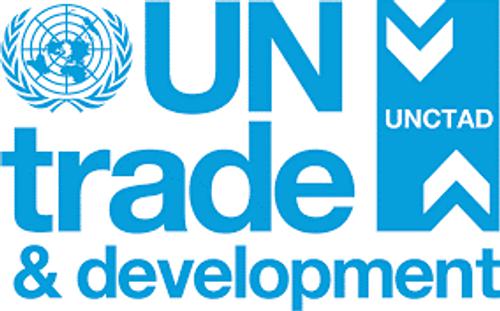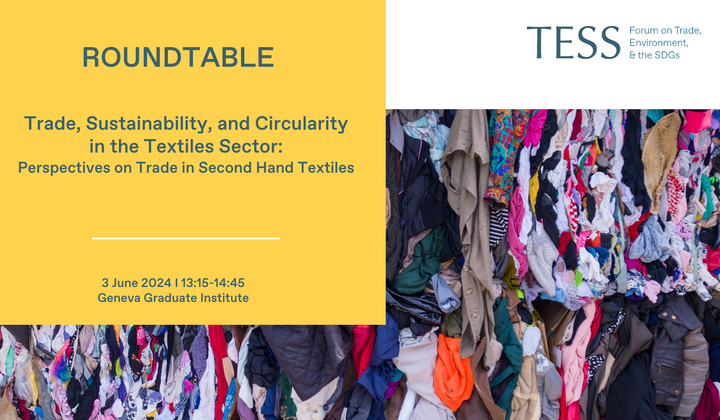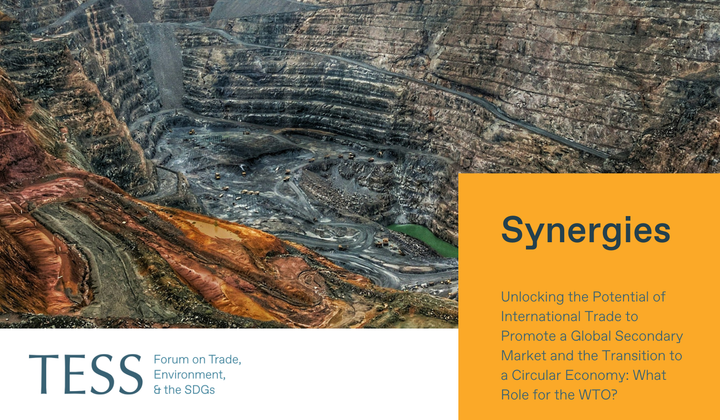During Geneva Trade Week 2025, TESS, UN Trade and Development (UNCTAD), the World Economic Forum, Circular Innovation Lab, and the Ellen MacArthur Foundation convened a panel on key aspects of the trade, circular economy, and sustainable development interface in today’s increasingly fragmented world, with a focus on opportunities to foster cooperation in key sectors.
The event explored the prospects and concrete opportunities for fostering inclusive cooperation on the circular economy, trade, and sustainable development interface. Following an opening discussion on ways forward on circular economy in a fragmented international trade landscape, the panelists focused on opportunities to bolster cooperation in key sectors, such as textiles, plastics, and critical minerals and in relation to a circular, sustainable bioeconomy.
Agenda
11:00–11:05 Welcome and Introductory Remarks
Carolyn DEERE BIRKBECK, Executive Director, Forum on Trade, Environment and the SDGs (TESS)
11:05–11:40 Circular Economy in a Fragmented World: Navigating Trade and Geopolitical Tensions
Moderator:
Arpit BHUTANI, Chief Operating Officer, Circular Innovation Lab
Discussion starters:
- Shunta YAMAGUCHI, Policy Analyst, Organisation for Economic Co-operation and Development (OECD) (Online)
- Jocelyn BLERIOT, Executive Lead, Ellen MacArthur Foundation
- Elisa TONDA, Chief, Resources and Markets Branch, Economy Division, United Nations Environment Programme (UNEP)
- Aik Hoe LIM, Director, Trade and Environment Division, World Trade Organization (WTO)
11:40–12:25 Options for Trade Cooperation To Foster a Circular Economy Transition in Key Sectors
Moderator:
Arpit BHUTANI, Chief Operating Officer, Circular Innovation Lab
Discussion starters:
- Henrique PACINI, Economist, UN Trade and Development (UNCTAD): Plastic pollution (Online)
- Jack BARRIE, Lead Global Materials Collaboration, World Economic Forum: Circular bioeconomy
- Apoorva ARYA, Chief Executive Officer, Circular Innovation Lab: Critical minerals
- Patrick SCHRODER, Senior Research Fellow, Environment and Society Centre, Chatham House: Textiles
12:25–12:30 Concluding Remarks
Christophe BELLMANN, Head of Policy Analysis and Strategy, TESS
Background
The global economy’s reliance on a linear model of extraction, transformation, and disposal of natural resources is increasingly raising concerns among governments and stakeholders from a sustainability and human health perspective, as well as for economic resilience and supply chain security. In response, the past decade has seen a proliferating array of policies and initiatives from governments, intergovernmental organizations, businesses, and civil society organizations to promote a shift to a more circular economy. In today’s highly integrated global economy, trade and trade policy play a critical role in this transition by reducing, regulating, and managing trade flows that undermine circular economy approaches while harnessing those that support circular economy outcomes.
Trade occurs at virtually all stages of the life cycle of a range of key value chains—from trade in raw materials through final consumer products to trade in re-manufactured goods, secondary raw materials, or waste. Yet, the lack of coordination, consultation, and cooperation among trading partners has resulted in growing differences across jurisdictions in definitions of key concepts, product classifications, standards, and regulations, which in turn increase the cost of a circular economy transition, particularly for small and medium-sized enterprises.
There is also a range of questions about how developing countries can leverage circular economy approaches in ways that support their sustainable development and their returns from trade, while guarding against approaches that undermine their environmental, social, and economic priorities. Current geopolitical tensions crystallizing around trade further exacerbate uncertainties and existing policy fragmentation. In this context, there is an urgent need for collective approaches that send the right signals to companies and across international supply chains to shift investment, spur innovation, and generate new economic opportunities that support sustainability objectives.
Fostering Inclusive Cooperation on Circular Economy, Trade, and Sustainable Development: Prospects and Sectoral Insights
You can watch the full event video.









